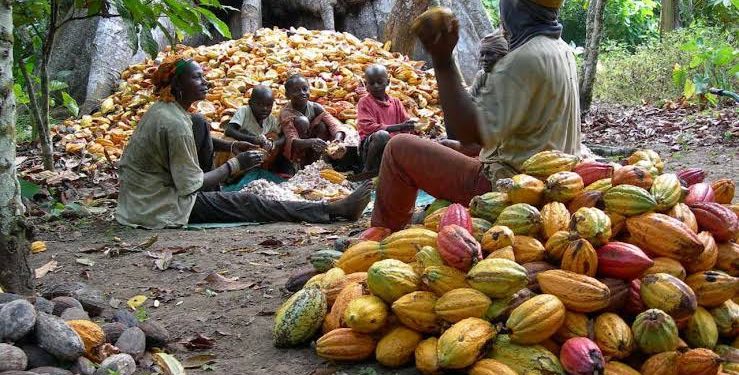Cocoa prices climbed to $8,796 per ton in mid-week U.S. futures trading, a rally driven by speculative buying amid ongoing U.S. tariffs and global supply disruptions. This spike arrives at a critical moment for Nigeria, which is positioning cocoa as a long-term economic pillar and a top non-oil foreign exchange earner.
Currently ranked sixth among global cocoa exporters, Nigeria produced approximately 280,000 metric tons of cocoa by the end of 2022. That number grew to 340,000 tons at the start of 2024, and the National Cocoa Management Board (NCMB) aims to raise it further to 500,000 metric tons in the near future. Still, Nigeria trails significantly behind global leaders like Côte d’Ivoire, Ghana, and Indonesia, which produce between 739,000 and 2 million tons annually.
A historic global supply shortfall remains the dominant bullish driver, compounded by erratic weather and trade policy uncertainties. While growing inventories help sustain prices, production instability in major regions continues to unsettle the market. Meanwhile, Ghana expects a better 2025/2026 harvest after recent setbacks due to climate impacts, illegal mining, and input shortages. The country’s output is projected to drop to just 590,000 tons in the 2024/2025 season, well below its 650,000-ton benchmark.
Nigeria, in contrast, is betting on increased exports and local processing. Vice President Kashim Shettima emphasized that the government is shifting its focus from raw cocoa exportation to processing and value addition. “We don’t want to be just producers of cocoa; we want to be processors. A ton of cocoa currently fetches $9,000, but processed cocoa can bring $30,000, and chocolate bars can go up to $50,000,” he said.
Shettima noted that President Bola Tinubu’s administration is committed to rebuilding the cocoa sector as part of a wider agricultural transformation agenda. One key move includes the establishment of the National Cocoa Management Board to lead this shift.
Despite being a top exporter of high-grade cocoa beans, Nigeria still imports cocoa powder from neighbouring ECOWAS countries, underlining the gap in local processing. Industry leaders are calling on the government to introduce policies that mandate local chocolate consumption, especially through school feeding programmes, to drive domestic demand.
President of the Cocoa Farmers Association of Nigeria, Abolarinwa, stressed that poor local demand has hampered the industry’s growth. “We ask ourselves why there’s no real local market for it? The answer is to make it compulsory in school diets,” he said.
The Tinubu administration sees cocoa as a gateway to reviving Nigeria’s lost agricultural glory, once diminished by the oil boom. With strategic policy focus, increased investment in agro-processing, and strong global demand, cocoa may soon take centre stage in the country’s economic recovery plans.










